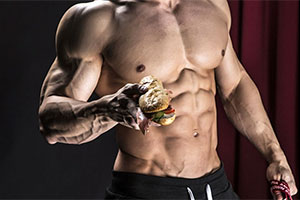For the longest time I believed that if you dieted to strictly your metabolism would slow to a crawl. This was Bodybuilding dieting gospel.
Skip breakfast? Now you’ve slowed your metabolism down for the entire day. No way you’re burning any fat now!
Turns out, your metabolism is not that complicated. The idea that you have to keep your metabolic furnace stoked with food is a complete myth. Just another example of “experts” trying to make nutrition more complicated then it needs to be.
The portion of your metabolism that is affected by what you eat is very small. The largest part of your metabolic rate is set by your body weight. If you weigh more your metabolism is higher (especially if it’s muscle), if you lose weight, your metabolism will go down.
The foods you eat effect your metabolism by something called “the thermic effect of food”, which is the energy it takes your body to process the food you eat for storage or use, but again this is very small compared to the amount of energy it takes just to “run” your body.
It makes no difference metabolically whether you eat many small meals or one large meal. What does make a difference is the make up of these meals. Protein, carbs, fats and different ratios of each all have very small effects on the “thermic effect of food” which then has a very small effect on your metabolism.
Bottom line- It’s still very important to eat “lean and green” and there are definite benefits to eating smaller meals throughout the day. But if you are looking to your diet as a way to control your metabolism, you’re missing the boat.
The best way to increase your metabolism is with exercise. Other than drastic changes in bodyweight, this is the one way you can control your metabolism. Effective weight loss programs like Craig Ballantyne’s Turbulence Training program or the ShapeShift program over at grrlAthlete.com are examples of good workout programs that can increase your metabolism.
Remember, if you miss a meal or cut your calories a little too low it doesn’t mean you’ve shut down your metabolism. Your diet is still incredibly important in the fat loss process – (In my opinion it’s even more important than your workouts), It’s just not the main regulator of your metabolic rate.
BP








